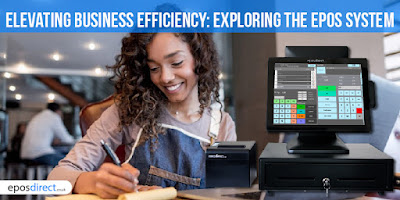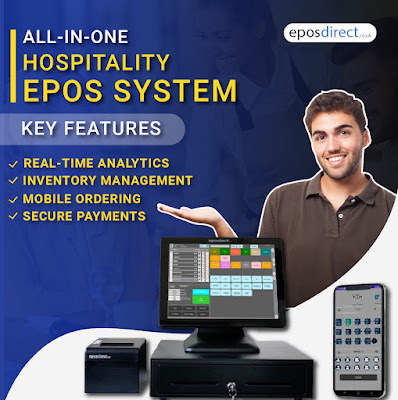In today's fast-paced
business environment, efficiency is the key to success. Whether you run a small
retail store or a bustling restaurant, managing your operations effectively can
make all the difference. One technology that has been instrumental in
streamlining business processes is the Electronic
Point of Sale (EPOS) system. In this article, we will explore the EPOS system,
its benefits, and how it can help elevate business efficiency.
Understanding the EPOS System
The EPOS system is a
computerized system that combines both hardware and software to facilitate
sales and inventory management. Unlike traditional cash registers, EPOS systems
offer a comprehensive solution that goes beyond simple transaction processing.
They are designed to handle a variety of tasks, including sales, inventory
tracking, customer data management, and reporting.
An EPOS system
typically consists of the following components:
1. Hardware: This includes a touchscreen monitor, cash drawer, barcode
scanner, receipt printer, and other peripherals. The hardware components are
the tools that your staff will use to process transactions and manage sales.
2. Software: EPOS software is the brain of the system. It allows you to
input product information, manage inventory, create and track customer orders,
and generate reports. Some EPOS systems also offer advanced features like employee management and
customer relationship management (CRM) tools.
3. Networking: EPOS systems can be connected to a central network,
enabling you to access data and perform remote management tasks. This is
particularly useful for businesses with multiple locations.
4. Payment Processing
Integration: EPOS systems
often come with integrated payment processing solutions, making it easy to
accept various payment methods, including credit cards, mobile payments, and
online orders.
5. Cloud-Based
Options: Many modern EPOS
systems offer cloud-based solutions, allowing you to access your data and
manage your business from anywhere with an internet connection.
Benefits of the EPOS
System
Now that we have a
clear understanding of what the electronic till system is, let's dive into its numerous benefits for businesses
of all sizes and industries.
1. Enhanced Accuracy
One of the most
significant advantages of an EPOS system is the increased accuracy it brings to
your business operations. Unlike manual cash registers, EPOS systems eliminate
human errors in calculation, ensuring that each transaction is recorded
accurately. This precision extends to inventory management, reducing the
likelihood of overstocking or running out of essential items.
2. Streamlined
Inventory Management
Efficient inventory
management is crucial for any business, and EPOS systems excel in this area.
With real-time inventory tracking, you can monitor stock levels, set up
automatic reorder points, and receive alerts when items are running low. This
prevents the loss of sales due to out-of-stock items and minimizes excess
inventory, saving you both time and money.
3. Improved Customer
Experience
EPOS systems offer
features like customer profiles, loyalty programs, and integrated CRM tools
that help you provide a better experience for your customers. You can easily
access a customer's purchase history, personalize recommendations, and offer
promotions tailored to their preferences. This fosters customer loyalty and
encourages repeat business.
4. Efficient Sales
Reporting
Generating sales
reports is a breeze with EPOS systems. You can access data on product
performance, sales trends, and employee productivity in real time. This
information is invaluable for making informed business decisions, optimizing
your product offerings, and identifying growth opportunities.
5. Streamlined
Checkout Process
EPOS systems offer a
faster and more efficient checkout process, reducing customer wait times and
enhancing the overall shopping experience. With features like barcode scanning
and integrated payment processing, cashiers can complete transactions quickly
and accurately.
6. Employee Management
Many EPOS systems
include employee management features, allowing you to track employee work
hours, measure their productivity, and calculate commissions or bonuses. It can
help you manage your workforce more effectively and motivate your staff.
7. Data Security
Data security is a top
priority for businesses, and EPOS systems come equipped with security measures
to protect sensitive customer information and transaction data. Encrypted
payment processing and user authentication help safeguard your business against
data breaches.
8. Scalability
EPOS systems are
highly scalable and can be tailored to the specific needs of your business.
Whether you run a small boutique or a large chain of stores, you can customize
your EPOS system to accommodate your growing requirements.
9. Integration
Capabilities
EPOS systems can
integrate with other business software, such as accounting, e-commerce, and
marketing tools. It streamlines data sharing and reduces the need for manual
data entry, further enhancing efficiency.
10. Cloud-Based
Accessibility
Cloud-based EPOS
systems offer the advantage of remote access to your business data. It means
you can manage your operations and monitor sales even when you're not on-site.
It's a game-changer for business owners who want the flexibility to oversee
their operations from anywhere.
Industries that
Benefit from EPOS Systems
EPOS systems are not
limited to a single industry; they can be applied to a wide range of
businesses. Here are some examples of industries that benefit from EPOS
systems:
Retail
In the retail sector,
EPOS systems are widely used by stores of all sizes. They provide efficient
inventory management, sales tracking, and customer data collection. Whether you
run a small boutique or a large department store, an EPOS system can help you
stay organized and serve your customers better.
Hospitality
Restaurants, cafes,
and bars benefit from EPOS systems to manage orders, split bills, and track
inventory. They can also integrate with kitchen display systems, which
streamline food preparation and ensure prompt service.
Healthcare
In healthcare, EPOS
systems used for patient registration, appointment scheduling, and prescription
management. They help medical facilities maintain accurate records and provide
efficient services to patients.
Events and Entertainment
EPOS systems used at
events and entertainment venues for ticket sales, concessions, and merchandise.
They ensure a smooth and speedy guest experience while collecting valuable data
on attendee preferences.
Salons and Spas
EPOS systems in salons
and spas simplify appointment booking, inventory management of beauty products,
and tracking customer preferences. They help maintain a high level of customer
satisfaction.
Automotive
In the automotive
industry, EPOS systems used in repair shops and spare parts stores. They help
with managing inventory, processing orders, and tracking vehicle service
history.
E-commerce
Even in the online
world, EPOS systems play a crucial role in managing orders, inventory, and
customer data. They are essential for businesses with both physical and online
store presence.
Selecting the Right
EPOS System
Choosing the right
EPOS system for your business is a critical decision. There are several factors
to consider:
1. Business Type: Consider the specific needs of your business, whether it's
a retail store, restaurant, or another type of establishment. Some EPOS systems
are better suited for certain industries.
2. Size and
Scalability: Ensure the EPOS
system can grow with your business. You don't want to outgrow your system too
quickly.
3. Features: List all the features you require, such as inventory
management, sales reporting, or customer relationship management. Compare EPOS
systems to find one that meets your needs.
4. User-Friendliness: The system should be intuitive and easy for your staff to
learn and use. Complicated systems can lead to errors and inefficiencies.
5. Integration
Options: Check if the
EPOS system can integrate with other software you use, such as accounting or
e-commerce platforms.
6. Support and
Training: Ensure the
provider offers adequate support and training for your team to use the system
effectively.
7. Data Security: Verify that the EPOS system has robust security measures
to protect your data and customer information.
8. Cost: Consider the initial setup costs, monthly fees, and any
additional charges for hardware, software updates, or customer support.
9. Reviews and
Recommendations: Read reviews and
seek recommendations from businesses in your industry who are already using
EPOS systems.
Challenges and
Considerations
While EPOS systems
offer numerous benefits, there are some challenges and considerations to keep
in mind:
1. Cost: EPOS systems can be a significant investment, especially
for small businesses. However, the long-term benefits often outweigh the
initial expenses.
2. Training: Your staff will need training to use the system
effectively. Be prepared for a learning curve and ensure proper training and
support.
3. Maintenance: Like any technology, EPOS systems require regular
maintenance and updates to ensure they function correctly.
4. Data Backup: It's essential to have a data backup and recovery plan in
case of system failures or data loss.
5. Internet Reliance: Cloud-based EPOS systems rely on an internet connection. A
stable connection is necessary for uninterrupted operations.
6. Compatibility: Ensure to shop till systems that are compatible with the hardware and software you
already use in your business.
7. Regulations: Depending on your location and industry, there may be
specific regulations regarding EPOS systems and data security. Ensure you
comply with all relevant laws.
Conclusion
EPOS systems have
revolutionized the way businesses operate, offering a wide range of benefits
that can significantly elevate business efficiency. From accurate transaction
processing to streamlined inventory management and enhanced customer
experiences, the advantages are clear. Moreover, EPOS systems are highly
adaptable and suitable for a variety of industries, making them a valuable
investment for businesses of all sizes.
When choosing electronic till systems for your business, it's essential to consider your specific needs, the scalability of the system, user-friendliness, integration options, and data security. With the right system in place, you can streamline your operations, make more informed decisions, and ultimately, improve your bottom line. As technology continues to advance, EPOS systems will likely play an even more critical role in business efficiency, making them an essential tool for modern entrepreneurs.
Source by: https://www.eposdirect.co.uk/blog/elevating-business-efficiency-exploring-the-epos-system



No comments:
Post a Comment